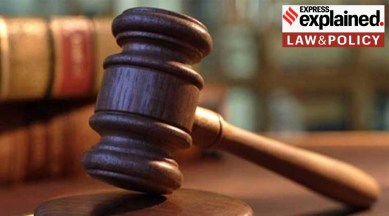Even if the accused is not present, the trial can still proceed: What does the proposed Code of Criminal Procedure say? Illustrated news

[ad_1]
The draft law stipulates that if the accused does not appear, the court can proceed with his trial after 90 days from the date of the charges.

An accused of a crime could be tried and convicted in absentia, as if he were present in court and had waived his right to a fair trial for all offenses under the proposed law. Bharatiya Nagarik Suraksha Sanhita, 2023, A draft law to replace the Criminal Procedures Law of 1973.
The right of the accused to participate fully in the trial and to present a defense is part of due process. While the Code of Criminal Procedure currently provides for evidence to be recorded in the absence of the accused, a trial in absentia is not permitted. If the accused is a fugitive, the state is obligated to locate him before the trial begins.
The draft law stipulates that if the accused does not appear, the court can proceed with his trial after 90 days from the date of the charges.
You are exhausted
Monthly limit for free stories.
to continue reading,
Simply register or log in
Read on for Indian Express Premium Membership.
This featured article is free for now.
Sign up to read more free stories and access offers from partners.
Read on for Indian Express Premium Membership.
This content is exclusive to our subscribers.
Subscribe now to get unlimited access to exclusive and premium The Indian Express stories.
“Convicting the accused in absentia is fine if the aim is to provide a solution to the victim, but it does not provide a fair chance to the accused,” said Professor Kumar Askand Pandey, a criminal law expert at the National Law University. Lucknow He said.
Most read
“Notwithstanding anything contained in this Act or in any other law for the time being in force, when a person declared guilty, whether jointly charged or not, flees to evade trial and there is no immediate prospect of arrest, it shall be deemed a waiver for the right of such person to be present and trial in person, and the court, after recording the reasons in writing, and in the interest of justice, proceed in the same manner and in the same manner as in effect as if he had been present, hereby sanhita and pronouncement of judgment: Provided that the court shall not commence the trial till after the expiry of period of ninety days from the date of the charge,” Section 356 of the Bharatiya Nagarik Suraksha Sanhita Act states.
Strict counterterrorism legislation provides for trial in absentia, such as the Unlawful Activities (Prevention) Act (UAPA) where an alternative criminal legal framework applies. In such laws, the burden of proof is reversed – the burden of proving not guilty lies with the accused rather than the state with the duty to prove guilt against the accused.
⚖️Want to better understand the Centre’s recent comprehensive reform of criminal laws? We’ve got you covered. Check out some of our special reports:
👉🏼 From Video Trials to Community Service as Punishment: The Center’s Reform of Criminal Laws
👉🏼 The main provisions and processes proposed in the bill to replace the CrPC
👉🏼 Expert explains: What does the proposed legislation to reform the criminal justice system mean?
👉🏼 From Video Trials to Community Service as Punishment: The Center’s Reform of Criminal Laws
© Indian Express (P) Limited
First published on: 12-08-2023 at 07:07 IST
[ad_2]
Source link





